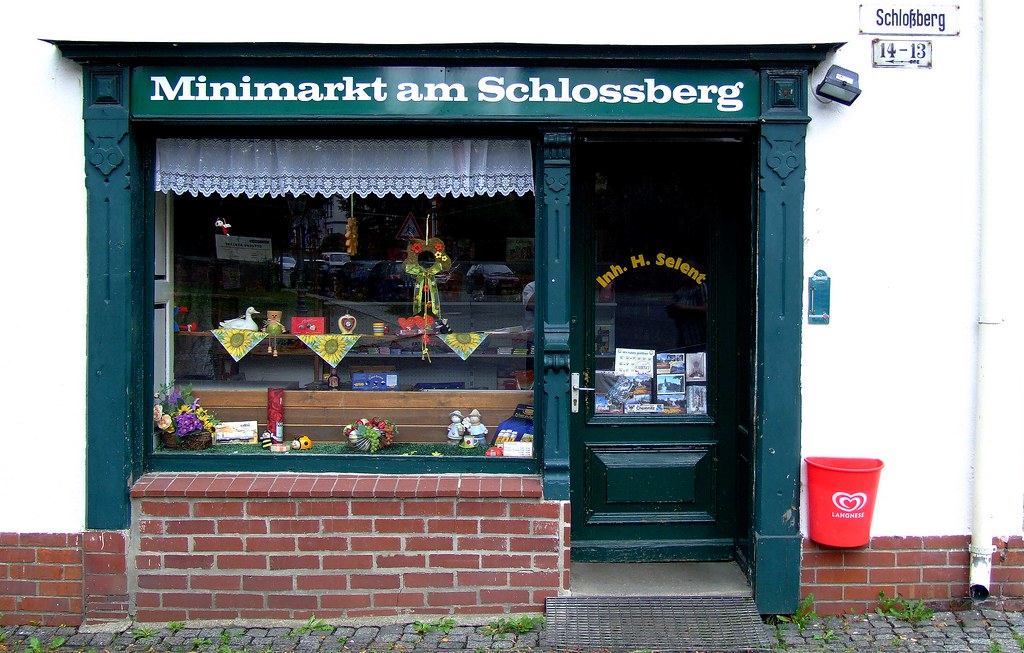Untranslatable German Words: Tante-Emma-Laden Posted by Sten on May 18, 2017 in Culture, Language, Traditions
We all have this Großmutter (grandmother), Onkel (uncle) or Tante (aunt) that complains that all the big Supermarktketten (supermarket chains) are taking over, and there is no space left on the market for the small shops, wie es früher mal war (like it once was back in the day). So as a sign of resistance, Tante Emma opened her own little grocery store. That is a Tante-Emma-Laden, right? No?
What is a Tante-Emma-Laden?

A German Lebensmittelladen in the 1950s (Image by Jty at Commons.wikimedia.org under license CC BY 2.5)
Simply put, a Tante-Emma-Laden is a small Lebensmittelladen (grocery store). It is a small corner store where you can buy Lebensmittel (groceries) and many other products you might need – you will be surprised by the variety of products offered at such a small store! It is much more personable than a large Supermarkt such as a German Aldi, Lidl or Rewe (comparable to American Safeway, Walmart or Albertsons).
What does Tante-Emma-Laden mean?
Literally, Tante-Emma-Laden means “Aunt-Emma-Store”. Many of these small Tante-Emma-Läden emerged after the Second World War, and were typically run and owned by families. The employees are more likely to help you find what you need. The word Tante-Emma-Laden, as these stores are called in everyday language, came from the women who often worked in such stores. During the 1950s, Emma was a general term for a maid, or a person giving a helping hand. A Tante (aunt) is often – or at least was, back in those days – someone trustworthy you knew. Because the Tante-Emma-Läden are usually right in the neighborhood, many shoppers know the shop owner personally. In many cases the women working there fit this perfectly. Or they had many such traits: They were helpful, friendly, personable – just like your aunt Emma!
An English Alternative
In English, one might call this a “mom-and-pop-store” or simply “cornerstore”. In case of a “mom-and-pop-store”, there are the similar kinds of traits in play as in the Tante-Emma-Laden. Run by somebody trustworthy, helpful, friendly, personable!
Decline
Unfortunately, the amount of Tante-Emma-Läden has been on the decline ever since large Supermarktketten spread. However, there is a nostalgic push back to old times, and some new Tante-Emma-Läden are opened, and others are preserved!
Use
The use is really simple. Colloquially, you can always use it, no matter the context. In a more formal manner, it makes more sense to refer to it as a kleiner Lebensmittelgeschäft (small grocery shop).
Gedicht
Norbert van Tiggelen made a Gedicht (poem) about Tante-Emma-Läden, which you can read below. I made a translation further below!
Keinen Kampf um Einkaufswagen,
auch kein lautes Kindsgeschrei,
Herzblut pochte in Regalen,
vom Schnittbrot bis zum Bio-Ei.
Auf dem kalten Tresen glänzten,
Bonbongläser hoch poliert,
fandest keinen launisch Kunden,
der sich kalt im Gang verirrt’.
Ein Stück Fleischwurst an der Theke,
reichte man in Kinderhände,
saß das Geld nicht ganz so locker
gab’s Kredit bis Monatsende.
Wie gern ging ich als kleiner Bub,
in diese schmucken Lädchen rein,
wo man immer lieb gefragt wurd’,
„Bitteschön darf’s noch was sein?“
Einkauf an der Straßenecke,
stressfrei und in Harmonie,
dabei Plaudern mit dem Nachbarn
das war pure Nostalgie.
Translation
No fight over a shopping cart,
Also no children shouting loudly,
Blood sweat and tears in the shelves,
from the sliced bread to the organic egg.
On the cold counter they shone,
well-polished cookie jars,
couldn’t find a moody customer,
Who found himself coldly in the wrong isle.
A piece of sausage at the counter,
was given into children’s hands,
If there was no money left to spare,
you got a credit until the month’s end.
How much I liked to go as a small kid,
into these wonderful little stores,
where I was always asked with a gentle voice,
“Would you like to have anything else?”
Getting groceries at the street corner,
without stress and in harmony,
while chatting with the neighbor,
that was nostalgia, purely.
Thank you for reading! Are there such things as Tante-Emma-Läden where you are from? How are they called there? Also, would you prefer to shop at a supermarket or a Tante-Emma-Laden? Let me know in the comments below!

Build vocabulary, practice pronunciation, and more with Transparent Language Online. Available anytime, anywhere, on any device.






Comments:
Maynard Spitzack:
Great article! It brought back many fond memories of the small neighborhood store. Thanks!
Denise Leigh:
ich kauf’ am liebsten bei Aldi. Es gibt keinen kleinen Tanta-Emma Laeden hier in der Naehe.
Petra Neuhoff Gilbert:
I have been to the “Tante Emma Laden” in my youth in Berlin Germany. As an adult we one here in Orange California, (Matterns) and love the familiar feeling.
Judith:
Wo ich in Schottland wohne, gibt es ein Tante-Emma-Laden.
Alexis Klug:
I recently read that there is a word, “backpfeifengesicht” that is used for someone that really needs to be punched in the face, do you think you could expand on that? Like, how do you say it and where did it come from?
Is it even really a word?
Constanze:
@Alexis Klug Hi Alexis! Constanze here. I was about to link you to my post on Backpfeifengesicht, as I was sure I’d written one, but it turns out I haven’t (?) ! So I will write a post on it! It definitely is a word – not a very nice one, obviously. 😉
Alexis Klug:
@Constanze @Contanze thanks that would be amazing! I can’t wait to read it! ?